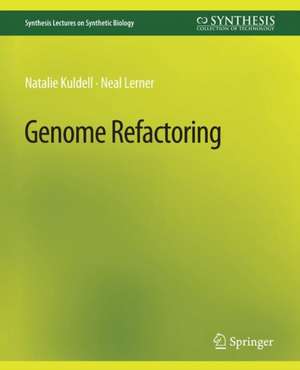Genome Refactoring: Synthesis Lectures on Synthetic Biology
Autor Natalie Kuldell, Neal Lerneren Limba Engleză Paperback – 16 iul 2009
Preț: 142.85 lei
Nou
Puncte Express: 214
Preț estimativ în valută:
27.34€ • 29.71$ • 22.98£
27.34€ • 29.71$ • 22.98£
Carte tipărită la comandă
Livrare economică 17-23 aprilie
Preluare comenzi: 021 569.72.76
Specificații
ISBN-13: 9783031014413
ISBN-10: 3031014413
Ilustrații: XII, 66 p.
Dimensiuni: 191 x 235 mm
Editura: Springer International Publishing
Colecția Springer
Seria Synthesis Lectures on Synthetic Biology
Locul publicării:Cham, Switzerland
ISBN-10: 3031014413
Ilustrații: XII, 66 p.
Dimensiuni: 191 x 235 mm
Editura: Springer International Publishing
Colecția Springer
Seria Synthesis Lectures on Synthetic Biology
Locul publicării:Cham, Switzerland
Cuprins
Tools for Genome Engineering and Synthetic Biology.- Bacteriophage as Templates for Refactoring.- Methods/Teaching Protocols for M13 Reengineering.- Writing and Speaking as Biological Engineers.- Summary and Future Directions.- Appendix A.- Appendix B.- Appendix C.
Notă biografică
Natalie Kuldell teaches in the Department of Biological Engineering at the Massachusetts Institute of Technology. She develops discovery-based curricula drawn from the current literature to engage undergraduate students in structured, reasonably authentic laboratory and project-based experiences. She completed her doctoral and postdoctoral work at Harvard Medical School, including experiments aimed at better understanding the regulated gene expression in the bacteriophage lambda. In 2005, she coedited a book on zinc-finger proteins with Shiro Iuchi, Zinc Finger Proteins: From Atomic Contact to Cellular Function. Her current research examines gene expression in the yeast, Saccharomyces cerevisiae, focusing on synthetic biology and improved tools for regulation of gene expression of the yeast mitochondria. Before joining the faculty of MIT, she taught at Wellesley College. Dr. Kuldell is the director of a web-based resource called BioBuilder to teach synthetic biology through comics and animations, as well as a scientific adviser for two web-projects to teach the nature and process of science, namely, Understanding Science and VisionLearning. She serves as Associate Education Director for SynBERC, an NSF-funded research center for Synthetic Biology, and Councilor at Large for the Institute of Biological Engineering. She is also one of three Boston-area coordinators for a public outreach network, the Coalition for the Public Understanding of Science.Neal Lerner is Director of Training in Communication Instruction for the Program in Writing and Humanistic Studies at the Massachusetts Institute of Technology, where he teaches scientific and technical writing and supports lecturers and graduate students who teach in communications-intensive classes. Previous to MIT, he was a faculty member and Writing Programs Coordinator at the Massachusetts College of Pharmacy & Health Sciences. He earned an Ed.D. in Literacy, Language, and Cultural Studies from Boston University's School of Education and an MA in creative writing and a high school English teaching credential from San Jose State University. His current research is a history and contemporary classroom study of teaching high-school English in Holyoke, MA. He is a four-time recipient of the International Writing Centers Association Outstanding Scholarship Award and received the National Council of Teachers of English Award for Best Article Reporting Historical Research in Technical or Scientific Communication (2008). He is the author of The Idea of a Writing Laboratory (Southern Illinois University Press, 2009), coauthor with Mya Poe and Jennifer Craig of Learning to Communicate in Science and Engineering: Case Studies from MIT (MIT Press, 2010), and coauthor with Paula Gillespie of The Longman Guide to Peer Tutoring, 2nd ed. (Longman, 2002). His publications have appeared in College English, College Composition and Communication, Written Communication, IEEE Transactions on Professional Communication, Journal of Technical Writing and Communication, Writing Center Journal, and several edited collections. He has held regional and national office in professional organizations for the study and teaching of writing and is a frequent consultant to colleges and universities in the United States and abroad on issues of teaching writing, writing program assessment, and writing across the curriculum.

